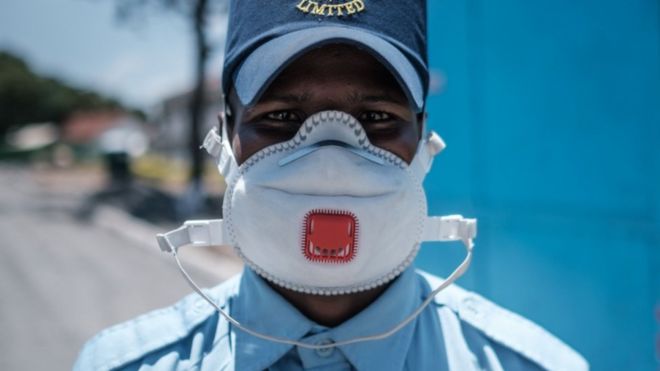Several African states have imposed far-reaching restrictions in a bid to curb the spread of coronavirus.
South Africa has announced a ban on travel from the worst-affected countries and has banned gatherings of more than 100, while Kenya has also imposed sweeping travel restrictions.
The measures are an attempt to prevent a major outbreak on a continent with poor health services.
At least 27 African states have so far been affected by the virus.
Liberia, where more than 4,800 died during the Ebola outbreak of 2014 and 2015, has become the latest African state to report a case of coronavirus.
The executive director of the state-run Environmental Protection Agency (EPA), Eugene Nagbe, tested positive after returning from Switzerland on Friday.
In total, more than 300 people have been diagnosed with the virus in Africa. Six deaths have been reported.
Most of the cases involve people arriving from Europe and North America.
But South Africa imposed the most severe restrictions on its citizens since the end of white-minority rule after reporting its first local transmission.
In an address to the nation on Sunday, President Cyril Ramaphosa declared a national disaster as the number of cases rose to 61.
"Initially, it was people who had travelled out of the country, especially from Italy, who had positively tested for the virus," he said.
"It is concerning that we are now dealing with internal transmission of the virus," Mr Ramaphosa said.
What else has South Africa done?
Mr Ramaphosa said he would chair a government command council that would "coordinate all aspects of our extraordinary emergency response".
Among the measures he announced are:
- The closure of nearly half - 35 out of 72 - of South Africa's land border crossings from Monday, along with two of its eight sea ports
- Banning foreign nationals from eight countries - including the UK and US - from entering South Africa from Wednesday
- Advising people to avoid domestic travel
- Shutting all schools with immediate effect until the end of the Easter holidays
- Banning all public gatherings of more than 100 with immediate effect. This forces the cancellation of the biggest annual event in South Africa - an Easter religious service attended by several million followers of the Zionist Christian Church at its headquarters in northern Limpopo province.
Latest Stories
-
CHRAJ report settles matters against Kusi Boateng – Lawyer
22 seconds -
Growing dissatisfaction with democracy demands citizen-centered governance – Mavis Zupork Dome
3 mins -
Ghana’s Democracy: Choices, not elections will drive change – Benjamin Offei-Addo
9 mins -
PRESEC-Legon marks 86 years with launch of groundbreaking AI lab on November 30
12 mins -
Limited citizen participation threatens Ghana’s democracy – Prof. Kwesi Aning
21 mins -
Contractor storms basic school to drive out students from classroom, claiming government owes him
41 mins -
The quest for peaceful election: religious and traditional leaders should be part of election observers
47 mins -
NDC has better policies to boost economy through agricultural, oil sectors – Ato Forson
49 mins -
Yaw Ampofo Ankrah calls for Kurt Okraku and Executive Council to resign over AFCON failure
60 mins -
Coalition of teachers to boycott December election over unpaid salary arrears
1 hour -
Uphold ethics in fight against fraud – First National Bank CEO
1 hour -
CHRAJ recommends forensic audit of National Cathedral project
1 hour -
I cried every three days at the beginning of my career – Gyakie
1 hour -
#ChoosePeaceGh Campaign: JoyNews partners Catholic Relief Services beyond 2024 December 7 Elections
1 hour -
CHRAJ report scratched the surface on “the double identity” of Rev. Kusi Boateng – Ablakwa
2 hours

